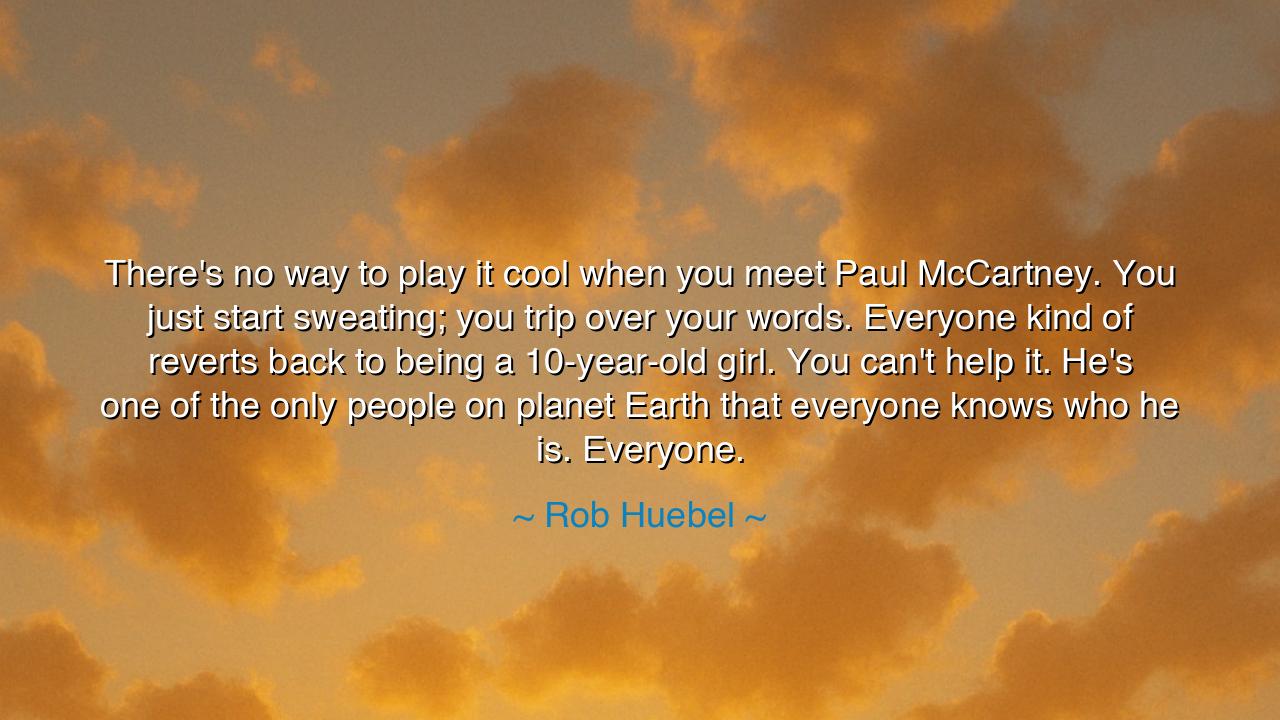
There's no way to play it cool when you meet Paul McCartney. You
There's no way to play it cool when you meet Paul McCartney. You just start sweating; you trip over your words. Everyone kind of reverts back to being a 10-year-old girl. You can't help it. He's one of the only people on planet Earth that everyone knows who he is. Everyone.






In the words of Rob Huebel, “There's no way to play it cool when you meet Paul McCartney. You just start sweating; you trip over your words. Everyone kind of reverts back to being a 10-year-old girl. You can't help it. He's one of the only people on planet Earth that everyone knows who he is. Everyone,” we encounter a profound truth about the nature of fame, awe, and the power of human connection. Huebel’s experience speaks to the universal human response to encountering someone who has left an indelible mark on the world. In the presence of such legendary figures, all pretensions and defenses fade, leaving us vulnerable to a primal sense of wonder. McCartney is not just a musician—he is a living symbol of cultural history, a person whose identity is interwoven with the very fabric of modern life.
This experience of being starstruck is not new to the human condition. The ancients too were moved by the presence of those who held great power or wisdom, and they understood the awe that such figures could inspire. The story of Alexander the Great, for example, reveals how even the most powerful men could be humbled in the presence of greatness. After his conquests, Alexander sought the counsel of the oracle of Delphi, and when asked for guidance, he knelt before the oracle, a man of immense power showing respect to a spiritual authority. Similarly, when encountering those whose impact on culture or humanity is profound, we too cannot help but revert back to the pure, childlike admiration that ties us all together.
Think of the response of the people to the appearance of Socrates, the philosopher who stood apart from the conventional wisdom of his time. Despite his humble appearance and simple lifestyle, Socrates’ intellect and ideas left a lasting impact on the intellectual history of the world. Those who met him, while awestruck by his ideas, often found themselves humbled and even nervous in his presence. His words, though delivered simply, could cause profound shifts in perception, leaving even the greatest minds of Athens in awe. Just as Paul McCartney’s presence evokes a reversion to youthfulness and nervous excitement, the ancients recognized the power of true greatness to stir something deeply human within us—an awe that transcends time and place.
Paul McCartney embodies this kind of greatness, not simply through his music but through his legacy. As a founding member of The Beatles, he helped shape the cultural landscape of the 20th century. His music, a soundtrack to the lives of millions, bridges generations. This is the essence of legendary influence—the ability to be both an individual and a symbol of something larger than oneself. McCartney’s influence stretches across time, and his name is instantly recognized by millions, making him one of the few people on Earth who holds such universal recognition. Like the great leaders and philosophers of the past, McCartney is not just a person but a symbol of the dreams and aspirations of millions.
To understand the depth of Huebel’s statement, we must recognize the influence of culture and legacy on the individual. When we encounter such figures, we do not simply see a man or woman, but the confluence of generations and histories. Paul McCartney represents the very dreams of a generation, the soundtrack of revolution in music, and the embodiment of the power of art to change the world. His presence does not merely remind us of the man but of the world he helped shape. Just as the ancient epic heroes were seen as embodiments of ideals, McCartney transcends his own identity to become a living myth, someone whose aura evokes the history he has helped create.
This feeling of awe in the presence of greatness is a reminder of the humility and vulnerability that defines us as humans. Whether it is McCartney, Socrates, or even Alexander, we are all capable of being moved by something greater than ourselves. The lesson here is that greatness does not just reside in the person, but in the way they touch the lives of others and shape the world around them. When we are faced with true greatness, we are reminded that we are part of a larger story, one that is ever-unfolding.
In practical terms, we can apply this lesson by recognizing that every interaction is an opportunity to influence others, whether through words, actions, or art. Like McCartney, we each have the power to leave a mark on the world—one that will resonate through generations. And, like Huebel, we must acknowledge that true greatness lies not just in the achievements of the individual, but in the universal connection they create. Let us be mindful of our legacy, knowing that one day, we too may become symbols of something larger than ourselves, inspiring awe in others who encounter the fruits of our efforts.






AAdministratorAdministrator
Welcome, honored guests. Please leave a comment, we will respond soon